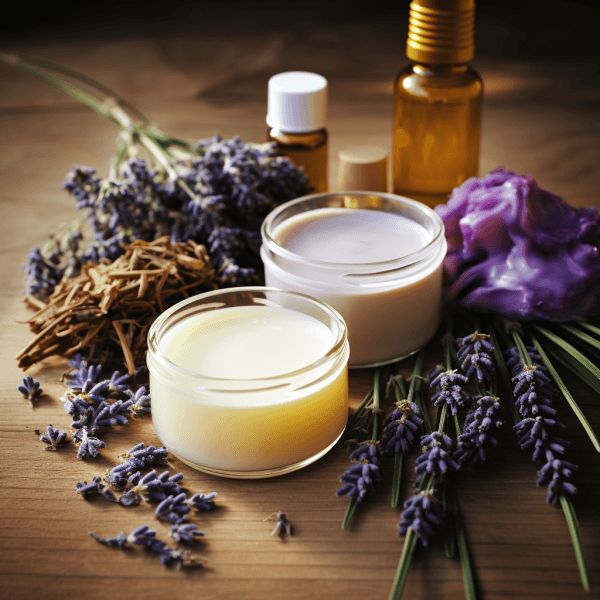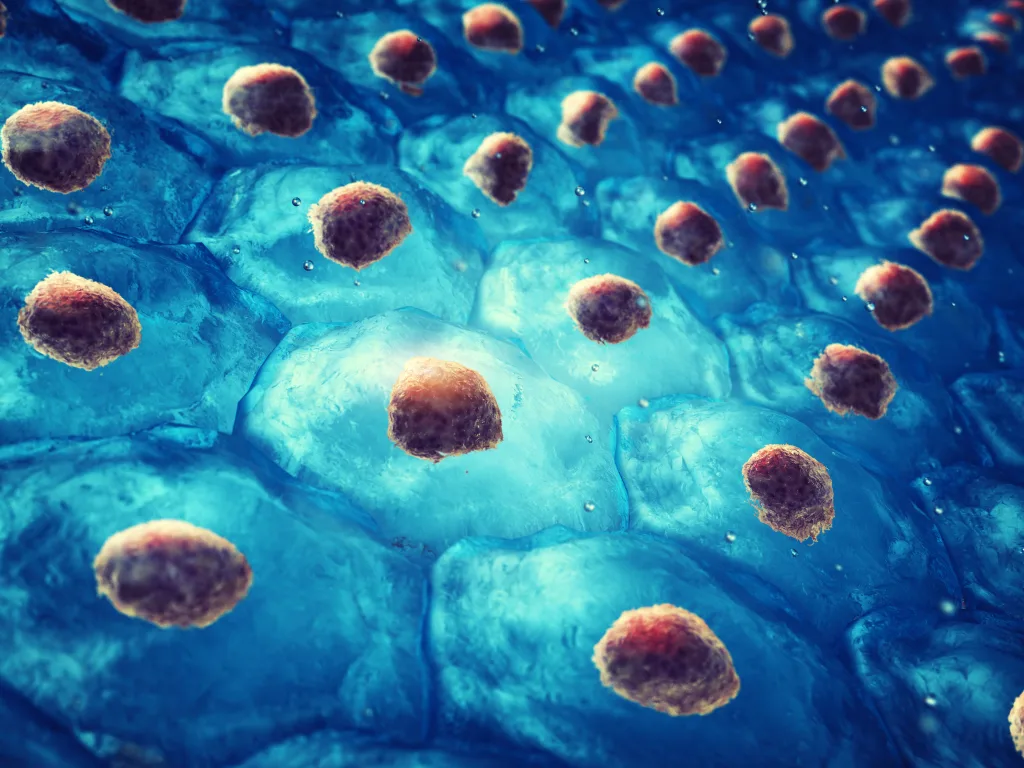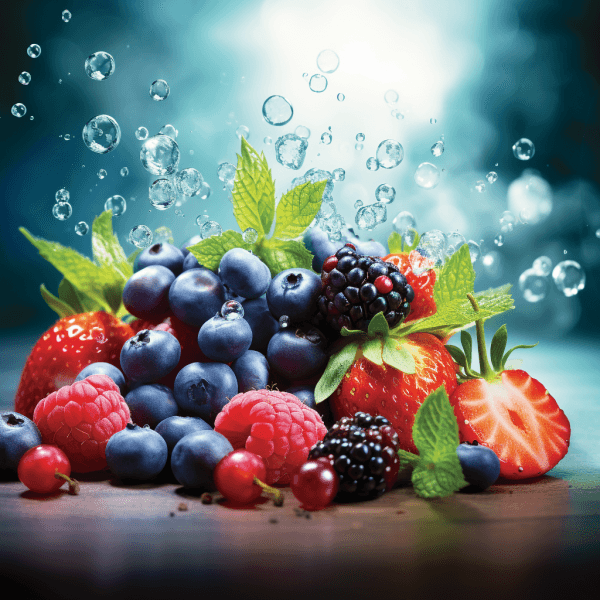Table of Contents
Introduction

You know that moment when you smooth on a cream and it just feels right? Beneath that glide isn’t just comfort—it’s biology at work. Your skin is alive, constantly repairing, protecting, and adapting. When you choose natural skincare for healthy skin, you’re not just indulging in a beauty ritual—you’re engaging with an entire biological system that thrives on the right support.
Your skin is the body’s largest organ, a living shield that absorbs, responds, and communicates with the world around you. And here’s the fascinating part: natural ingredients can actually interact with this system at a cellular level—strengthening the lipid barrier, calming inflammation, balancing the microbiome, and even boosting collagen production.
In this guide, we’ll explore how natural skincare benefits your skin health, not just on the surface but deep within. From antioxidants that fight oxidative stress to microbiome-friendly botanicals, every detail is grounded in science and designed to show you how nature and biology work together to keep your skin resilient, radiant, and strong.
For a complete overview of the science behind natural skincare, see our main guide: Natural Skincare Science.
The Biology of Skin: Foundation of Natural Skincare for Healthy Skin
Your skin isn’t just a surface to protect—it’s your body’s largest organ and a living ecosystem. Made of water, proteins, lipids, and minerals, it acts as your personal shield, climate control system, and sensory dashboard all at once. Understanding this biology is the key to knowing how natural skincare benefits skin health.
Let’s zoom in layer by layer (Yousef et al., 2024):
1. Epidermis-The Frontline Shield: The outermost layer of your skin acts like a fortress, blocking environmental aggressors while giving your complexion its tone. Built mostly of keratin-producing cells, the epidermis is organized into five sub-layers that renew themselves continuously—keeping your barrier strong and resilient.
2. Dermis-The Structural Powerhouse: Just below, the dermis provides strength and elasticity. Rich in collagen and elastin, it supports firmness and bounce while housing sweat glands, hair follicles, and an intricate network of blood vessels.
3. Hypodermis-The Cushion and Insulator: The deepest layer, packed with fat cells, acts like natural padding and insulation—helping your skin withstand bumps and temperature swings.

But your skin’s role doesn’t stop at structure. It’s a full-service operator, performing critical functions for overall health:
- Protection: Defends against UV rays, pollutants, and pathogens.
- Thermoregulation: Maintains ideal body temperature through sweating and blood vessel control.
- Sensation: Detects touch, heat, and pain through specialized receptors.
- Excretion: Eliminates metabolic byproducts via sweat.
- Absorption: Allows certain nutrients and topical compounds to enter.
- Vitamin D synthesis: Produces this vital vitamin when exposed to sunlight.
And here’s a detail often overlooked: your skin is home to its own microbiome—a diverse community of microorganisms that balance pH, support immunity, and act as an extra layer of defense.
Bottom line: knowing the biology of your skin isn’t just academic. It’s the foundation for understanding how natural skincare for healthy skin can actually reinforce these processes—keeping your complexion resilient, balanced, and thriving.
The Cellular Impact of Natural Ingredients: How Nature Works Beneath the Surface
Think of your skin at the microscopic level as a bustling city—billions of tiny workers repairing, protecting, and communicating to keep everything running smoothly. When natural ingredients enter this scene, they act like skilled contractors, upgrading the city’s infrastructure and ensuring long-term resilience. This is where the benefits of natural skincare become most visible—at the cellular level.

The Cellular Impact of Natural Ingredients: How Nature Works Beneath the Surface
Think of your skin at the microscopic level as a bustling city—billions of tiny workers repairing, protecting, and communicating to keep everything running smoothly. When natural ingredients enter this scene, they act like skilled contractors, upgrading the city’s infrastructure and ensuring long-term resilience. This is where the benefits of natural skincare become most visible—at the cellular level.
Regeneration and Repair: Nature’s Renovation Crew
Natural compounds deliver vitamins, minerals, and antioxidants straight to your skin cells. These act as catalysts, helping cells repair damage, replace worn-out components, and strengthen their defenses. Plant-derived antioxidants neutralize free radicals—the unstable molecules that accelerate aging—supporting skin’s natural healing and repair (Michalak et al., 2023).
Collagen: The Skin’s Scaffolding
Collagen is the framework that keeps skin smooth and firm. Certain botanical extracts have been shown to stimulate collagen production, helping skin maintain elasticity and reducing visible signs of aging. More collagen means fewer sagging structures and a plumper, healthier look.
Elastin: The Flexibility Factor
If collagen is the scaffolding, elastin is the spring system—allowing skin to stretch and snap back without losing shape. Some plant-based compounds help preserve elastin fibers, protecting against the gradual loss of suppleness that comes with time and stress.
In short, the cellular impact of natural ingredients goes beyond surface-level pampering. They interact with your biology to promote repair, boost collagen and elastin, and defend against oxidative stress—the core of why natural skincare supports healthy skin.
The Lipid Barrier: Nature’s Blueprint for Skin Hydration and Protection

Picture your skin barrier as a luxury brick wall—solid, elegant, and built to last. The “bricks” are your skin cells, but the real magic lies in the “mortar”: a mix of ceramides, fatty acids, and cholesterol. This lipid matrix is what keeps moisture in, irritants out, and your complexion smooth and resilient. When compromised, dryness, irritation, and sensitivity quickly creep in—showing why the benefits of natural skincare often focus on strengthening this barrier (Baker et al., 2023).
.Ceramides: The Moisture Keepers
Ceramides act like dams, locking water inside your skin. Plant-derived ceramides, in particular, help restore hydration, reduce irritation, and fortify the barrier long after application.
Fatty Acids and Cholesterol: The Silent Custodians
Fatty acids help seal the bonds between skin cells, preventing cracks in the barrier while soothing inflammation. Cholesterol adds flexibility, ensuring the barrier adapts to daily stressors. Together, they form an invisible coat of armor that protects skin health.
Why This Matters
A healthy lipid barrier is the foundation of natural skincare for healthy skin. By choosing products rich in ceramides, fatty acids, and cholesterol, you’re essentially handing your skin a set of natural tools to lock in hydration, fend off aggressors, and maintain long-term resilience.
Biological Interplay with Natural Antioxidants: Defending Skin from the Inside Out
If your skin were a fortress, free radicals would be relentless raiders—unstable molecules constantly looking for weak points in the walls. Left unchecked, they damage proteins, lipids, and even DNA, speeding up visible aging. Natural antioxidants are the defense squad, neutralizing these attackers and reinforcing skin resilience. This is one of the most powerful benefits of natural skincare.
The Antioxidant Defense Mechanism
Free radicals are generated by everyday life—sun exposure, pollution, even natural metabolism. Antioxidants step in by donating electrons, stabilizing free radicals before they can wreak havoc. This chemical rescue slows premature aging, reduces inflammation, and helps preserve skin vitality.Nature’s Antioxidant Repository.

Botanical Compounds and Skin Health
These plant-derived antioxidants do more than prevent damage—they also help repair it. By boosting the skin’s natural defense systems, they enhance resilience against environmental stressors, from UV rays to urban pollution (Turcov et al., 2023).
Topical Application and Benefits
Applying antioxidants directly to the skin gives them a front-row seat in the battle against oxidative stress. Many plants produce these compounds as their own defense against sunlight and harsh climates. In skincare, they bring that same protection to your complexion, delivering polyphenols, flavonoids, carotenoids, and terpenes straight to the cells that need them most.
The Multifaceted Shield: How Natural Antioxidants Defend Against UV Radiation
The Free Radical Combatants
UV exposure triggers the formation of reactive oxygen species (ROS), a particularly aggressive form of free radicals. Antioxidants scavenge these ROS, preventing them from damaging skin cell membranes, proteins, and DNA.
Nature’s Soothing Embrace
UV rays don’t just cause oxidative stress—they can also spark inflammation. Natural antioxidants like polyphenols and curcumin have anti-inflammatory properties that calm irritation and help skin recover faster.
Bolstering the Skin’s Natural Fortifications
Some antioxidants stimulate the skin’s own repair systems, enhancing DNA repair and encouraging the production of the body’s internal antioxidants. This double layer of protection strengthens the skin’s defenses over time.
The UV Absorbers
Certain antioxidants—such as flavonoids—can physically absorb some UV radiation, reducing how deeply it penetrates the skin and minimizing potential damage.
Guardians of the Genetic Code
DNA damage from UV light can lead to mutations and, in severe cases, skin cancer. Antioxidants not only help prevent this damage but also support the repair of any harm that slips through.
A Word of Sun-Safe Wisdom
While antioxidants are powerful allies, they’re not a solo act for sun safety. For complete protection, combine them with a broad-spectrum sunscreen, sun-protective clothing, and shade during peak sunlight hours.
Natural Antioxidants in Skincare
- Vitamin C – The Citrus Marvel
From oranges, lemons, and grapefruits, vitamin C brightens skin, supports collagen production, reduces inflammation, and offers UV protection. - Vitamin E – The Nutty Guardian
Found in almonds, sunflower seeds, and hazelnuts, vitamin E deeply moisturizes, calms redness, and protects against UV-induced oxidative stress. - Green Tea – Nature’s Soothing Elixir
Rich in polyphenols, green tea defends against UV damage and reduces inflammation, making it a favorite in calming skincare formulas. - Carotenoids – The Colorful Protectors
Present in carrots, tomatoes, and sweet potatoes, carotenoids improve texture, reduce UV damage, and give skin a healthy glow. - Resveratrol – The Berry Benefactor
From grapes, berries, and peanuts, resveratrol protects against UV stress and inflammation, while supporting skin longevity. - Coenzyme Q10 – The Cellular Energizer
Naturally occurring in the body and found in fatty fish and whole grains, CoQ10 boosts cellular energy, reduces fine lines, and protects from oxidative damage. - Aloe Vera – The Soothing Sentry
Packed with vitamins C, E, and polyphenols, aloe vera hydrates, calms irritation, and protects against oxidative and UV stress. - Turmeric – The Golden Healer
Rich in curcumin, turmeric reduces inflammation, supports wound healing, and helps guard against UV damage. - Bakuchiol – The Gentle Retinol Alternative
Derived from Psoralea corylifolia, bakuchiol smooths fine lines, evens tone, improves elasticity, and delivers antioxidant protection—without the irritation retinol can cause.
Bottom line: Natural antioxidants are far more than trendy add-ons. They’re multitasking protectors—defending, repairing, and fortifying your skin against both everyday stress and environmental assaults. By understanding their role and choosing the right combinations, you give your skin a fighting chance to stay youthful, resilient, and glowing for years to come.
The Skin Microbiome: Nature’s Tapestry on Our Skin

Your skin isn’t just a protective wrap—it’s a living, breathing ecosystem. Trillions of microorganisms—bacteria, fungi, and even viruses—call it home. Together, they make up the skin microbiome, a community that quietly shapes the way your skin looks, feels, and responds to its environment.
When balanced, this microscopic metropolis acts as an extension of your skin barrier, guarding against harmful invaders, regulating pH, and supporting immune defenses. When disrupted, it can leave the door open to irritation, breakouts, or even chronic skin issues (Haykal et al., 2024).
Natural Allies of the Skin Microbiome
- Prebiotics – The Microbial Menu
Think of prebiotics as the favorite snacks of your skin’s friendly bacteria. Ingredients like inulin, fructooligosaccharides, and galactooligosaccharides feed the good guys, helping them thrive and crowd out potential troublemakers. - Probiotics – The Reinforcements
These are live, beneficial bacteria applied directly to the skin. Strains like Lactobacillus and Bifidobacterium can soothe inflammation, strengthen the barrier, and restore balance after it’s been disrupted. - Plant Extracts – Nature’s Gentle Bouncers
Botanical ingredients such as tea tree oil, lavender oil, and chamomile extract bring mild antimicrobial powers, keeping harmful bacteria in check while letting beneficial species flourish. - Natural Oils – The Barrier Builders
Oils like jojoba, argan, and rosehip don’t just moisturize—they help seal and strengthen the skin’s barrier. A robust barrier creates the perfect environment for a balanced microbiome to thrive.
A Word of Caution
Not every “natural” ingredient is a microbiome-friendly hero. Some botanicals, despite their skincare benefits, can disrupt microbial balance, leading to irritation or flare-ups. The goal isn’t to sterilize your skin—it’s to foster harmony. That means choosing products specifically formulated to support, not strip, your microbiome.
Note: The term ‘skin microbiome’ is utilized in this article, aligning with the terminology used in many of the referenced sources. While ‘skin microbiota’ specifically refers to the community of microorganisms on the skin, ‘skin microbiome’ encompasses these microorganisms along with their genetic material. Both terms are scientifically relevant, and the choice of terminology may vary in different texts.
Natural Ingredients and Inflammation: A Balanced Perspective
Understanding Skin Inflammation
Inflammation is your skin’s built-in alarm system—necessary in small doses, but harmful when left unchecked. Whether triggered by irritants, injury, or chronic conditions like eczema or psoriasis, inflammation shows up as redness, swelling, itching, or dryness. Long-term, it weakens the skin barrier and accelerates aging. This is where the anti-inflammatory benefits of natural skincare make a difference.
Natural Ingredients: The Anti-Inflammatory Arsenal

- Aloe Vera – Loaded with antioxidants, enzymes, and vitamins A and C, aloe vera calms itchiness, reduces redness, and soothes flare-ups, especially in psoriasis and eczema.
- Chamomile – A botanical peacekeeper that inhibits enzymes driving inflammation, making it both soothing and preventive.
- Calendula – This flower extract tempers the body’s inflammatory response, helping skin recover more comfortably.
- Green Tea – Packed with anti-inflammatory polyphenols, green tea reduces redness and irritation while providing antioxidant protection.
- Turmeric – Its star compound, curcumin, blocks key inflammatory pathways, easing discomfort and promoting healing.
- Colloidal Oatmeal – A classic skin soother that locks in moisture while calming irritation, making it ideal for sensitive skin.
- Niacinamide – A form of vitamin B3 that reduces the production of pro-inflammatory substances, easing redness and irritation.
- Licorice – Offers natural anti-inflammatory and skin-brightening benefits, helping to calm stressed skin.
- Saw Palmetto – Can help dial down inflammation and associated redness, particularly in certain skin conditions.
- Witch Hazel – A natural astringent with anti-inflammatory powers, helping to reduce swelling and soothe skin.
- Tallow –A byproduct from grass-fed cows, also find their way into skincare formulations due to their richness in fat-soluble vitamins A, D, E, and K. These vitamins are crucial for skin health, with vitamin E, in particular, being recognized for its anti-inflammatory properties that can help soothe and calm irritated skin. Discover more about the vitamin richness of tallow and its benefits for skin.
Choosing natural ingredients with proven anti-inflammatory effects can speed healing, reduce discomfort, and support long-term skin health. But keep in mind—responses can vary from person to person. For severe or persistent inflammation, consulting a dermatologist remains the safest route.
In Conclusion: Natural Skincare for Healthy Skin
After exploring the science behind natural skincare, one thing is clear: nature and skin health are deeply interconnected. From the lipid barrier that locks in hydration to antioxidants that neutralize free radicals, from microbiome-friendly botanicals to anti-inflammatory plant extracts—each element shows how the benefits of natural skincare extend far beyond surface beauty.
When you choose natural ingredients backed by research, you’re not just following a trend. You’re giving your skin the tools it needs to repair, protect, and thrive. This is the essence of natural skincare for healthy skin: a partnership between biology and nature that keeps your complexion resilient, radiant, and strong for years to come.
FAQ
Natural skincare supports hydration, strengthens the skin barrier, balances the microbiome, reduces inflammation, and protects against environmental damage with antioxidant-rich botanicals.
Ceramides, fatty acids, and cholesterol are key for barrier repair. Plant-derived ceramides and nourishing oils like jojoba and argan are especially effective.
Prebiotics feed beneficial bacteria, probiotics help restore balance, and gentle botanicals or oils create the right environment for microbial diversity.
Yes. Aloe vera, chamomile, calendula, green tea, turmeric, and colloidal oatmeal all contain compounds that calm redness and irritation while supporting healing.
Vitamin C, green tea polyphenols, resveratrol, and certain botanical extracts stimulate collagen production, helping skin stay firm and youthful.
References
Yousef H, Alhajj M, Fakoya AO, et al. Anatomy, Skin (Integument), Epidermis. [Updated 2024 Jun 8]. In: StatPearls [Internet]. Treasure Island (FL): StatPearls Publishing; 2025 Jan-. Available from: https://www.ncbi.nlm.nih.gov/books/NBK470464/
Baker, P., Huang, C., Radi, R., Moll, S. B., Jules, E., & Arbiser, J. L. (2023). Skin Barrier Function: The Interplay of Physical, Chemical, and Immunologic Properties. Cells, 12(23), 2745. https://doi.org/10.3390/cells12232745
Haykal, D., Cartier, H., & Dréno, B. (2024). Dermatological Health in the Light of Skin Microbiome Evolution. Journal of cosmetic dermatology, 23(12), 3836–3846. https://doi.org/10.1111/jocd.16557
Michalak M. (2023). Plant Extracts as Skin Care and Therapeutic Agents. International journal of molecular sciences, 24(20), 15444. https://doi.org/10.3390/ijms242015444
Turcov, D., Zbranca-Toporas, A., & Suteu, D. (2023). Bioactive Compounds for Combating Oxidative Stress in Dermatology. International journal of molecular sciences, 24(24), 17517. https://doi.org/10.3390/ijms242417517
